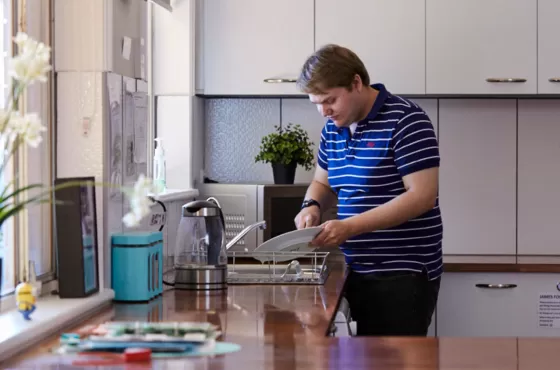Join us as we break down the differences between Specialist Disability Accommodation (SDA) and Supported Independent Living (SIL).
Specialist Disability Accommodation is about the bricks and mortar
Purpose of SDA
SDA refers to homes that are specially designed for people with extreme functional impairments. These homes incorporate features and modifications to make daily life easier and safer for occupants.
Examples of SDA
There are so many different SDA modifications available. These include wider doorways and hallways, and wheelchair-friendly counters in the bathroom and kitchen.
SDA also covers assistive technologies. Automated controls for heating and cooling or voice-controlled light switches are a couple of examples.
Funding for SDA
SDA funding is separate from your main NDIS supports and is paid directly to providers. It covers the building cost of the specialized housing or a share of the cost, if living in a shared arrangement. Participants still pay rent contributions and bills.
Supported Independent Living is about the personal support
Purpose of SIL
Through SIL, you can access support to help you live within an SDA home (or another type of suitable housing) as independently as possible.
Examples of SIL
SIL services cover all important daily tasks. You’ll get help with:
- Personal care (such as showering and dressing).
- Household tasks (such as cooking and cleaning).
- Developing independent living skills.
- Medication management.
- Participating in your community.
It’s all about building a routine and a lifestyle you love!
Funding for SIL
SIL funding falls under 'core supports' within your NDIS plan. Funding amounts (and whether or not you’ll be in a shared house) are determined by your individual support requirements.
The key takeaway: SDA is the 'where' and SIL is the 'how'
Imagine SDA as your specialised and accessible 'house' and SIL as the support team that helps you thrive within it. Now, that’s much easier to remember, isn’t it?
Looking for a SIL provider you can depend on? Be supported in a family-style home by skilled support staff
Who needs both SDA and SIL?
You might need both SDA and SIL funding if you…
- Have very high support needs.
- Require accessible housing due to mobility limitations or other functional impairments.
- Need 24/7 daily living support with personal care, skill development, and community engagement.
Choosing the Right Combination
Understanding your needs
Your first step is an NDIS assessment. Here, your housing and support needs will be assessed and you’ll be told if you qualify for SDA, SIL, or both.
Separate allocations
The NDIS treats SDA and SIL funding separately. While they can co-exist and work together, both must be considered and approved during the planning stage.
Resources to help you
- NDIS website The NDIS website is the best source of information for all things NDIS. Once there, use the search bar to look for more information on SDA and SIL.
- SDA Design Standard For specifics on SDA features, visit the SDA Design Standard page on the NDIS website.
- Your Support Coordinator They can help you understand the housing and support options available to you.
The NDIS puts YOU in control! By knowing the difference between SDA and SIL, you can make informed choices and build a better quality of life for yourself.
Moving out or leaving the family home is a big decision. You and your loved ones may have a lot of questions, but we're here to help. If you have any questions, you can email live@ld.org.au, call 08 8256 9800 or fill out this form.
